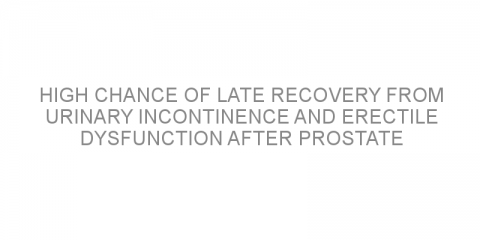In a nutshell This study examined evidence for the role of prostate surgery in treating high-risk prostate cancer. Authors concluded that surgery is an effective primary treatment option for men with high-risk disease. Some background Localized prostate cancer is cancer that is confined to the prostate gland. Men with high-risk localized prostate...
Read MoreTreatment(s) now being considered-Radical prostatectomy Posts on Medivizor
High chance of late recovery from urinary incontinence and erectile dysfunction after prostate surgery
In a nutshell This study examined the long-term recovery rates from urinary incontinence (UI) and erectile dysfunction (ED) for men with prostate cancer treated with surgery. Researchers concluded that men with UI or ED 12 months after prostate surgery have a high chance of late recovery. Some background Prostate surgery is one of the treatment...
Read MoreCancer cells left behind: Even close surgical margins increase the risk of recurrence
In a nutshell This study investigated the risk of disease recurrence after prostate surgery based on surgical margins. Authors reported an increased risk of disease recurrence among men with close surgical margins. Some background Removal of the prostate gland is a common treatment of localized (confined) prostate cancer. Prostate surgery is...
Read MoreCan immune cells predict disease recurrence after prostate surgery?
In a nutshell This study evaluated whether the neutrophil-to-lymphocyte ratio (NLR) can predict disease recurrence after treatment with prostate surgery. Researchers reported a strong association between high NLR and disease recurrence after prostate surgery. Some background Neutrophils are cells that are involved in inflammation (reaction to...
Read MoreErectile dysfunction and prostate surgery
In a nutshell This study investigated erectile function after prostate surgery in men with high-risk localized prostate cancer. Researchers reported high rates of erectile dysfunction following prostate surgery. Some background Surgical removal of the prostate gland is a common treatment for localized prostate cancer (cancer confined to the...
Read MoreGene production and the risk of prostate cancer recurrence
In a nutshell The authors aimed to determine the effect of two genes – ERG and PTEN – as markers in prostate cancer progression. Some background Prostate surgery is a common treatment in prostate cancer. It involves surgically removing the prostate gland. The ERG gene is a cancer gene that contains a protein...
Read MorePTEN loss and prostate cancer tumor upgrading
In a nutshell The authors determined the effect of PTEN in tumor upgrading in prostate cancer patients. Some background Prostate surgery is a common treatment in prostate cancer. It involves surgically removing the prostate gland. The PTEN gene acts as a tumor supressor (protects normal cells from progressing to...
Read MoreFat levels in the blood and the risk of prostate cancer recurrence
In a nutshell The authors determined the relationship between hypertriglyceridemia (high levels of a specific fat in the blood) and biochemical recurrence in prostate cancer patients following prostate surgery. Some background Prostate surgery is a common treatment for prostate cancer involving surgical removal of the prostate...
Read MoreDiabetes in prostate cancer patients – negative impact?
In a nutshell The authors determined the effect of diabetes on prostate cancer outcome following prostate surgery. Some background Prostate surgery is a common treatment for prostate cancer. It involves surgically removing the prostate gland. In some cases, additional health issues, such as diabetes, may have a negative impact on...
Read MoreSurgery and scar satisfaction in prostate cancer patients
In a nutshell The authors compared scar satisfaction in prostate cancer patients who underwent different surgical procedures. Some background Surgical removal of prostate gland is a common treatment in prostate cancer. There can be different types of surgical techniques. Laparascopic surgery (standard surgery) involves several small...
Read MoreCan PDE5 inhibitors increase the risk of cancer recurrence after prostate surgery?
In a nutshell The authors aimed to determine the effect of phosphodiesterase type 5 inhibitors on cancer recurrence in patients after prostate surgery. Some background Prostate surgery is a form of treatment that involves surgically removing the prostate gland in patients with prostate cancer. Some patients may experience erectile dysfunction...
Read MoreTreatment for erectile dysfunction after surgery
In a nutshell The authors aimed to determine the effect of phosphodiesterase type 5 inhibitors (PDE5) on treating erectile dysfunction following prostate surgery. Some background Prostate surgery is a form of treatment that involves surgically removing the prostate gland in men with prostate cancer. Some patients may experience erectile...
Read More













